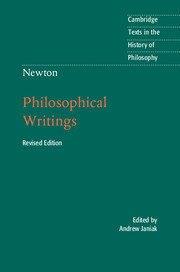Description
Newton: Philosophical Writings (2nd Ed., Revised edition)
Cambridge Texts in the History of Philosophy Series
Coordinator: Janiak Andrew
This revised edition contains a wide range of Newton's writings that have influenced the development of philosophy in modern Europe.
Language: English
Subject for Newton: Philosophical Writings:
Publication date: 08-2014
Support: Print on demand
Support: Print on demand
Description
/li>Contents
/li>Biography
/li>
Sir Isaac Newton (1642?1727) left a voluminous legacy of writings. Despite his influence on the early modern period, his correspondence, manuscripts, and publications in natural philosophy remain scattered throughout many disparate editions. In this volume, Newton's principal philosophical writings, including excerpts from the Principia and the Opticks and a corrected translation of 'De Gravitatione', are collected in a single place. This newly expanded second edition of Philosophical Writings contains new excerpts from Newton's earliest optical writings, some of his unpublished reflections on the interpretation of Scriptural passages that concern the Earth's motion, and his correspondence with important figures in his day, including the theologian Richard Bentley, the mathematician Roger Cotes, and the philosopher G. W. Leibniz. The excerpts show in depth how Newton developed a number of highly controversial views concerning space, time, motion and matter and then defended them against the withering criticisms of his contemporaries.
Introduction; Chronology; Further reading; Note on texts and translations; 1. 'New theory about light and colors' [1672]; 2. Correspondence with Robert Boyle [1679]; 3. De Gravitatione [date unknown]; 4. The Principia [1687, first edition]; 5. 'An account of the system of the world' [c.1687]; 6. Correspondence with Richard Bentley [1691–3]; 7. Correspondence with Leibniz [1693 and 1711–12]; 8. Correspondence with Roger Cotes [1713]; 9. An Account of the Book Entitled Commercium Epistolicum [1715]; 10. Queries to the Opticks [1721].
Andrew Janiak is Creed C. Black Associate Professor of Philosophy at Duke University.
© 2024 LAVOISIER S.A.S.
These books may interest you

Newton: Philosophical Writings 83.99 €

The Cambridge Companion to Newton 132.66 €


